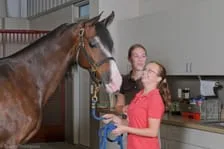
Because of advances in nutrition, management and health care, horses are living longer, more
useful lives. It’s not uncommon to find horses and ponies living well into their 20s and 30s.
While genetics play a role in determining life span, you too, can have an impact.
You may think that turning your old-timer out to pasture is the kindest form of
retirement. But horses are individuals. Some enjoy being idle; others prefer to be a part of the
action. Whatever you do, don’t ignore the horse. Proper nutrition, care and exercise will help
the animal thrive. Follow these guidelines to develop a total management plan for your older
horse:
1. Observe your horse on a regular basis. Watch for changes in body condition, behavior and
attitude. Address problems, even seemingly minor ones, right away.
2. Feed a high quality diet. Avoid dusty and moldy feeds.
3. Feed your older horse away from younger, more aggressive ones so it won’t have to compete
for feed.
4. Feed at more frequent intervals so as not to upset the digestive system. Two-three times daily
is best.
5. Provide plenty of fresh, clean, tepid water. Excessively cold water reduces consumption
which can lead to colic and other problems.
6. Adjust and balance rations to maintain proper body conditions. A good rule of thumb is to be
able to feel the ribs but not see them.
7. Provide adequate, appropriate exercise to maintain muscle tone, flexibility and mobility.
8. Groom your horse frequently to promote circulation and skin health.
9. Be aware that older horses are prone to tumors. Look for any unusual lumps or growths from
head to tail as well as beneath the tail (especially on gray horses).
10. Schedule routine checkups with your equine veterinarian. Call immediately if you suspect a
problem.
A quick response to ailments, injuries or a decline in fitness can keep your older horse from
having a serious or prolonged setback. That means less worry for you and a better quality of life
for your old friend. For more information about caring for the older horse, ask your equine
veterinarian for the “Older Horse” brochure, provided by the American Association of Equine
Practitioners in partnership with Educational Partners Bayer Animal Health and Purina Mills,
Inc. Visit the AAEP website, www.aaep.org/horseowner, for additional information about caring
for the older horse.
10 Tips for Preventing Colic
The number one killer of horses is colic. Colic is not a disease, but rather a combination of signs
that alert us to abdominal pain in the horse. Colic can range from mild to severe, but it should
never be ignored. Many of the conditions that cause colic can become life threatening in a
relatively short period of time. Only by quickly and accurately recognizing colic – and seeking
qualified veterinary help – can the chance for recovery be maximized.
While horses seem predisposed to colic due to the anatomy and function of their digestive
tracts, management can play a key role in prevention. Although not every case is avoidable, the
following guidelines from the American Association of Equine Practitioners (AAEP) can
maximize the horse’s health and reduce the risk of colic:
1. Establish a daily routine – include feeding and exercise schedules – and stick to it.
2. Feed a high quality diet comprised primarily of roughage.
3. Avoid feeding excessive grain and energy-dense supplements. (At least half the horse’s
energy should be supplied through hay or forage. A better guide is that twice as much
energy should be supplied from a roughage source than from concentrates.)
4. Divide daily concentrate rations into two or more smaller feedings rather than one large
one to avoid overloading the horse’s digestive tract. Hay is best fed free-choice.
5. Set up a regular parasite control program with the help of your equine practitioner.
6. Provide exercise and/or turnout on a daily basis. Change the intensity and duration of an
exercise regimen gradually.
7. Provide fresh, clean water at all times. (The only exception is when the horse is
excessively hot, and then it should be given small sips of luke-warm water until it has
recovered.)
8. Avoid putting feed on the ground, especially in sandy soils.
9. Check hay, bedding, pasture, and environment for potentially toxic substances, such as
blister beetles, noxious weeds, and other ingestible foreign matter.
10. Reduce stress. Horses experiencing changes in environment or workloads are at high risk
of intestinal dysfunction. Pay special attention to horses when transporting them or
changing their surroundings, such as at shows.
Virtually any horse is susceptible to colic. Age, sex, and breed differences in susceptibility
seem to be relatively minor. The type of colic seen appears to relate to geographic or regional
differences, probably due to environmental factors such as sandy soil or climatic stress.
Importantly, what this tells us is that, with conscientious care and management, we have the
potential to reduce and control colic, the number one killer of horses.
For more information about colic prevention and treatment, ask your equine veterinarian
for the “Colic” brochure, provided by the American Association of Equine Practitioners in
partnership with Educational Partner Bayer Animal Health. Additional colic information is
available by visiting the AAEP’s website at www.aaep.org/horseowner.
Reprinted with permission from the American Association of Equine Practitioners.
